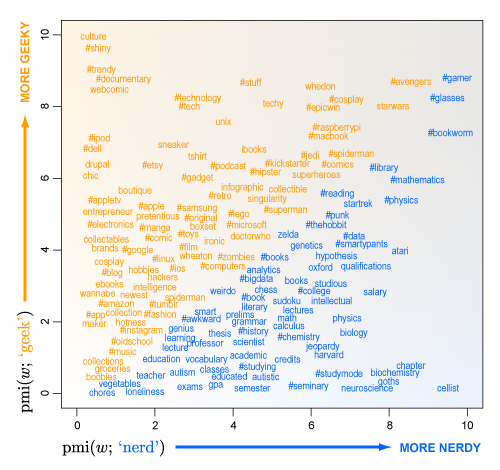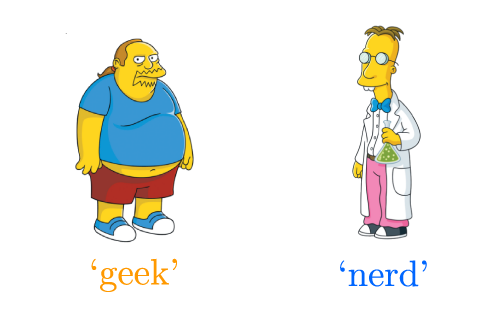I am trying to think through some ideas that have been slowly percolating. Any thoughts/comments welcome and encouraged.
I propose first that we can divide politics–on either side of the Red/Blue tribe divide–into “high” and “low”. High politics are those of the upper classes, the rich, the folks who already have power. Low politics are the concerns of rest of us.
“High” is not necessarily better or more important than “low.” They are just different.
To explain better, I want to draw an analogy with Free Northerner’s distinction between “Nerds” and “Geeks”:
One man did a statistical analysis of the usage of the words and how they correlate with other words. He defined them as such:
geek – An enthusiast of a particular topic or field. Geeks are “collection” oriented, gathering facts and mementos related to their subject of interest. They are obsessed with the newest, coolest, trendiest things that their subject has to offer.
nerd – A studious intellectual, although again of a particular topic or field. Nerds are “achievement” oriented, and focus their efforts on acquiring knowledge and skill over trivia and memorabilia.… The statistical analysis comes to this conclusion:
In broad strokes, it seems to me that geeky words are more about stuff (e.g., “#stuff”), while nerdy words are more about ideas (e.g., “hypothesis”). Geeks are fans, and fans collect stuff; nerds are practitioners, and practitioners play with ideas. Of course, geeks can collect ideas and nerds play with stuff, too. Plus, they aren’t two distinct personalities as much as different aspects of personality. Generally, the data seem to affirm my thinking.
FN also includes this graphic, from Burrsettles’s article, On “Geek” vs. “Nerd”:

Or to put it more plainly:

There is a great deal of overlap between “geek” and “nerd” culture, otherwise no one would bother trying to distinguish between them–no one makes graphs on the difference between “motorcycle culture” and “chefs,” not because chefs never ride motorcycles, but because they are very distinct groupings. Geeks and nerds, by contrast, lie on a sort of personality continuum, where the main difference is probably IQ. (Though obviously some of the semantic distinctions are random, eg, “goths” under “nerd” and “#Linux” under “geek.”)
To return to our original discussion, “nerds” are the “high” end and “geeks” the “low” end of a single culture. Nerds are (relatively) high-status, with paying jobs that advance the well-being of humanity. Geeks are low-status, with lower IQs (on average) and jobs that are not generally recognized as advancing humanity.
This doesn’t make it morally wrong or bad to enjoy comic books or Firefly; it’s just kind of low status to be obsessed with them.
Young people in search of their own place in the world often explore a variety of different cultures, marked by particular clothes, music, TV shows, etc. This includes geek culture, which many people enjoy in highschool/college, but find less time for as they get jobs, marry, have kids, and generally age.
Studying quantum physics is hard. I can’t do it. <1% of the population can do it. But almost anyone can play video games or watch Firefly. Lots of people can read comic books and put together a nice cosplay. These activities are fun and let people feel like they’re part of the same culture as Neil deGrasse Tyson and Caltech professors.
Let’s go back to politics.
I propose a similar division between “high” and “low” politics. For example, globalism is high Blue-tribe politics; trans rights are low blue-tribe politics. Most of the people who are actively involved in globalization are high-status people like diplomats, businessmen, or lawmakers. Most of the people actively fighting for trans rights are trans themselves or their lgbq-“allies,” all of whom are much lower status than businessmen.
On the right, nationalism is high politics (at least currently); anti-trans rights is low politics.
Basically, SJWs are low blue, and your traditional blue-collar Christian conservative is low red.
Just as lots of nerds enjoy videogames or Linux, so do high-status blues basically believe in a lot of SJW things, and high-status reds believe in a lot of conservative Christian things, but the beliefs do not absolutely overlap. High-status blues do not actually spend their spare time hanging out with trans people or poor blacks and Hispanics, though many SJWs do (or are.)
Likewise, the Republican leadership says it opposes abortion, but has actually devoted far more resources to killing Iraqis than to stopping abortion.
How much of low politics do high class people actually believe in, and how much is just vaguely associated with them? How much do they use as a bludgeon against others without actually believing?
Low politics are very easy to get a handle on, because the vast majority of people talk about them–the vast majority of us aren’t part of the top 1%, after all. They’re also entertaining. But what about high politics?
Right now, I’d say it’s nationalism vs. internationalism. But I’m sure it’s more than just that.
I think this is relevant:

[…] Source: Evolutionist X […]
LikeLike
I see the divide you are identifying, but I think it’s more trickle down than two distinct sets of contrast. The way I would describe it is as the tension between conformist followers and nonconformist distinction seekers.
To use the geek/nerd divide, observe the (crass) Facebook page “I f’ing love science.” The application of the scientific method has been a powerful tool for status science over the last century or two. So “science” has become a high status icon/idea/thing. Nerds are drawn to scientific study because they can expand on it and reap reward. That is, a nerd can push the rules of science to find something new. Geeks love the science brand, and will drink up anything that smells of it, even if it has no connection with the scientific method. Nerds differentiate, so nerd fiction will overlap some with geek fiction, but will always be more discerning (I know many Firefly fans who loathe Dr. Who, but none of the inverse).
LikeLike
Culture typically trickles down, so the high politics are (in my opinion) leaders finding ways to expand the values of their team. Blue team wants equality over all, so their high politics tends to look like a bunch of college professors finding new and increasingly loathsome groups to give hugs to. Red team wants liberty, so their high is finding new ways to bring liberty to foreign lands and cut taxes.
*Everything else in politics is void filling*
My team opposes their team, so we stand for their opposite. High red is for some stuff, so low blue is against it, but high blue is for some other stuff, and doesn’t really care to be against much (this is why high blue doesn’t actually raise taxes nowadays, why high red lets gays spread liberty abroad, etc.). It can get muddled on the low end, when it seems like the positive interests overlap (if the high red wants to spread liberty to non-whites, high blue may get frustrated that not all of these new liberty targets are treated equally (toppling Saddam is okay, but treating terrorists worse than other Iraqis is evil!).
The Internet muddles things, though. The requirement for distinction is voice, so low IQ, high ego types are being empowered to try their hands at iteration. I suspect that World War T would not have been on the docket at Harvard if it weren’t for the internet accelerating the pace of political iteration. Likewise high red talking about going back into Iraq or even into Iran. The lessons of the last Iraq war would have lasted at least a generation for high red, but they can’t learn. The Internet blocks negative social feedback mechanisms because low groups are followers and they never give up. Mass politics are always religious, and will nearly always operate as a ratchet unless there is a strong feedback mechanism. I probably should stop talking until I have my second cup of coffee; I get a bit rambly.
LikeLike
My spouse liked Dr. Who when he was a kid, but thought Firefly was mediocre.
In many ways, everyone involved is pretty conformist; the high-politics blues, though, tend to be very conformists. I mean, if there’s one thing trans people aren’t (at least in real life,) it’s conformist, whereas, say, Harvard Deans tend to be very conformist. But most people seem to be pretty happy being conformist within their own community–blues conform with other blues and reds with reds.
LikeLike
Firefly was the best damn half-season of TV I’ve ever seen. Not that I obsess about it, of course.
LikeLiked by 1 person
For example, globalism is high Blue-tribe politics; trans rights are low blue-tribe politics
I see what you’re saying, but black gimmedats and legalizing illegals low blue-tribe politics. Trans rights is bullshite that only the highs care about it. Most trans are highs anyway. Dindus really do NOT give a shit about trans rights. Some may claim they do, but only because their aping their own (half) black president.
LikeLike
Trans folks are overwhelmingly poor and low class. One survey found that 20% of them are homeless. (and 26% claim to have lost jobs for being trans.) A large % of employers probably think trans people are icky and don’t want a guy in a dress around their office or talking to customers. A rather large % of them end up as prostitutes and/or imprisoned, and prison is, of course, a very bad place for mtfs. (Also, “A staggering 41% of respondents reported attempting suicide compared to 1.6% of the general population.”)
By contrast, it looks like <1% of back people are homeless.
Even allowing for different definitions (this survey only looked at people in shelters and not people couch-surfing, which is still homelessness and probably more likely the kind experienced by trans people,) trans people are still poorer, on average, than blacks.
As I’ve noted before, most of the trans people I know have obvious, documented medical problems like prenatal exposure to artificial estrogens like DES or sex-chromosomal abnormalities. Medical problems, mental problems, and wealth tend not to correlate.
The rich people I’ve met seem pretty concerned about matters like racism and immigration (especially if they are hiring immigrants,) but I’ve yet to hear any of them say much at all about trans people, beyond including them, vaguely, in statements related to gay people. Hanging out with drag queens and prostitutes is not really their style.
But I could be wrong. I’m still trying to think this through.
LikeLike
[…] X dabbles in Pol Theory to start the week: High politics, Low politics, Red politics, Blue politics. I think she gets a lot right there. The thing to bear in mind is that they are not remotely […]
LikeLike
Where does one live to actually know trans “people”?
I want to meet sure I avoid that zip code
LikeLike
Obvious answer is “academia.” Actual chromosome disorders or fetal-estrogen-level problems don’t care about geography, though.
LikeLike
One would think but some how certain zip codes seem to act as a sink for the weird shit leading me to believe it’s more cultural then anything else
LikeLike
Academia seems to have a huge cultural effect on people. Growing up in a place like SF probably does, too. But all of the gay/trans people I’ve met who grew up in conservative places moved to more liberal places, which intensifies the character of such places.
LikeLike
And what if the trans person happens to be a businessman?
LikeLike
Is this the setup for a joke?
LikeLike
It could be. But it is also an indirect hit to those homophobes who think gays and related groups cannot contribute to society. I don’t know why, but many of them are successful. It seems they either become successful or are pushed to the very fringes of society. Of the few gays I know, all are the former, though I read about the existence of the latter.
LikeLike